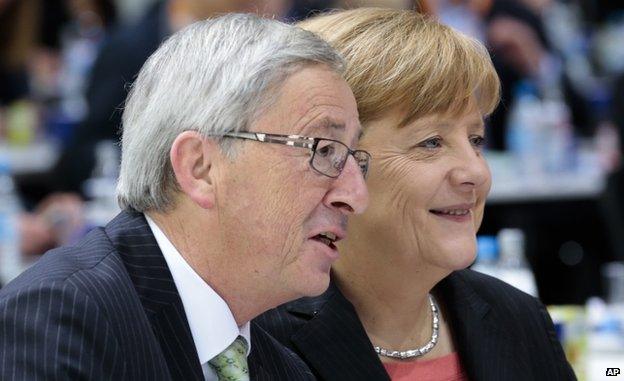Profile: EU's Jean-Claude Juncker
- Published
Tory MEP Syed Kamall and UKIP's Nigel Farage criticise the former Luxembourg prime minister.
The former Luxembourg Prime Minister, Jean-Claude Juncker, has taken charge of the European Commission, despite UK opposition.
He got a solid majority among MEPs in a secret ballot - 422 votes - and the support of 26 out of 28 EU governments.
But British MEPs in particular - the UK Independence Party and the Conservatives - were vocal in their opposition to him.
Mr Juncker, 59, based his claim to the EU's top job on being the Spitzenkandidat (lead candidate) of the centre-right European People's Party, which won the May elections.
His election is seen as a triumph for the European Parliament, which pioneered the Spitzenkandidat procedure. It was an effort to make the European elections more relevant to voters and give the EU more of a "human face".
But UK Prime Minister David Cameron said the parliament had usurped the right of government leaders to choose the EU's top executive. In the past that choice was made behind closed doors, and by unanimity, without a formal vote.
Mr Juncker is a controversial figure, as a leading advocate of deeper EU integration, and is often called a "federalist".
A veteran of Brussels deal-making, he headed the powerful Eurogroup - the eurozone finance ministers - at the height of the eurozone crisis, when crucial decisions were taken about austerity and bailout conditions.
Force behind euro
In a speech setting out his agenda, external for the EU on 15 July he stressed that the euro "protects Europe" and he praised former Commission president Jacques Delors, the man credited with launching the single currency.
Mr Juncker was prime minister of Luxembourg from 1995 to 2013 and one of the architects of the euro.
But according to Pierre Leyers, financial editor of the daily Luxemburger Wort, it is misleading to call him a "federalist". "He wants deeper integration, but not a European superstate," he told the BBC.
Mr Leyers argues that coming from a tiny country has enhanced Mr Juncker's influence in the EU, odd though that may seem to people unfamiliar with Brussels politics.
Luxembourg was a founding member of the community which became the EU and, sandwiched between France and Germany, "it had no choice but to try to be on good terms with its neighbours", Mr Leyers said. "So some Luxembourg politicians were always good negotiators and diplomats, to get France and Germany together."
The drive for post-war reconciliation shaped Mr Juncker's political views.
Early in his political career he worked for Prime Minister Pierre Werner, who helped to forge the Franco-German bond at the heart of the European project.
Mr Werner came up with a plan for monetary union which was later developed by Jacques Delors.
Mr Juncker went on to become one of the world's longest-serving democratically elected leaders.
Part of Brussels elite
But some of his past remarks have raised eyebrows, suggesting a less than firm commitment to democracy.
Ahead of the French vote on the European Constitution in 2005 he said: "If it's a Yes, we will say 'on we go', and if it's a No we will say 'we continue'".
And in 2011 he said "monetary policy is a serious issue - we should discuss this in secret, in the Eurogroup... I am for secret, dark debates".
His greatest EU challenge has been shoring up the eurozone since the 2008 financial crash, when Greece's colossal debts, and those of other struggling eurozone countries, threatened the very survival of the single currency.
The BBC's Ben Wright joined the former prime minister of Luxembourg on his campaign bus
In a high-profile TV debate on 15 May Mr Juncker said he had worked "night and day" to rescue Greece.
According to Mr Leyers, at the height of the crisis he was working 14 hours a day and that took a toll on his health. He is a heavy smoker.
He is by far the most popular politician in Luxembourg, added the journalist at the Grand Duchy's leading daily.
In the TV debate, Mr Juncker said it was now time for the EU to "replace debt by ideas" and achieve a digital single market, while ensuring "minimum social standards for workers".
He also called for an EU-US free trade treaty. The negotiations are controversial, amid widespread European anxiety about powerful US corporations.
'Social' Europe
Mr Juncker is a strong advocate of a European "solidarity" union - an EU that strives to raise living standards in its poorest regions and sectors.

Mr Juncker has been a close ally of Germany's Angela Merkel during the eurozone crisis
He has not explained how an EU-US free trade deal might impact on EU social protection policies, which currently cost the EU many billions through support for farmers and projects to help poor communities.
He claimed that such a deal would give each European an extra 545 euros (£443; $742) - an exaggeration, according to a fact check by Eurovision, external, which hosted the debate.
He has also defended the Common Agricultural Policy, saying agriculture employs about 30 million Europeans. But the UK government is among the many critics who say the CAP is wasteful and want more of the EU budget spent on digital technologies, research and investment in small businesses.
Mats Persson, director of the Open Europe think-tank, says Mr Juncker is associated with the EU of the 1980s and 1990s, echoing a criticism attributed to Prime Minister Cameron.
After an election that saw a surge in support for Eurosceptic parties, that connection with past EU policies may be a disadvantage, Mr Persson told the BBC.
However, Mr Juncker is not vague about the political risks of taking tough economic decisions. He once said, "We all know what to do, we just don't know how to get re-elected after we've done it."